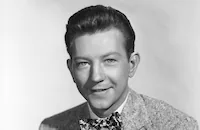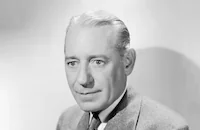The Milkman
Brief Synopsis
Cast & Crew
Charles T. Barton
Donald O'connor
Jimmy Durante
Piper Laurie
Joyce Holden
William Conrad
Film Details
Technical Specs

Synopsis
At the Club Nocturne, bumbling Roger Bradley and his date, Ginger Barton, are caught in a revolving door with gangster Mike Morrell. Just as things get straightened out, Roger sees what he believes is a runaway, driverless milk truck. Actually, the truck belongs to milkman Breezy Albright, an old friend of Roger's. Breezy explains to Roger and Ginger that he adapted the principle of an electric eye for use with sound and now controls his truck with a whistle. The next day, Roger tells his father, the owner of Bradley's Milk Company, that he wants a job. His father, however, does not believe that Roger has recovered from a traumatic accident during the war that causes him to quack like a duck when he is excited. The discouraged Roger then begs Breezy to help him get a job at the rival Happy Day milk company. Happy Day has been losing business to Bradley, and D. A. Abbott, the company's owner, blames manager John Carter, the nephew of major stockholder, Mrs. Laura Carter, for the situation. On Breezy's recommendation, Roger, pretending to be unrelated to the milk company Bradleys, is accepted as a milkman trainee. He is immediately smitten with Chris, Abbott's daughter, and tries very hard to become an outstanding milkman like Breezy. When Roger finally has a chance to go out on a route, however, he alienates all his customers, many of whom switch their accounts to Bradley. One day, while on a date in Buttermilk Lane, Roger and Chris have a chance encounter with Breezy and Ginger. Ginger innocently reveals Roger's real identity, and Chris, who has been keeping Roger's mistakes from her father, runs away. Meanwhile, Morrell confronts Carter, and demands that he steal his aunt's expensive necklace to pay his gambling debts. Carter places the stolen necklace in a bottle of milk and gives it to Roger to deliver to Morrell. Concerned about Roger's mistakes, Breezy follows him on his route. At Morrell's hotel, Roger demands eleven cents in payment for the milk, and when neither Morrell or his men can pay, refuses to hand over the milk. On his way out, Roger mistakenly assumes that the hotel is on fire and calls the fire department. In the ensuing confusion, a photographer snaps a picture and Breezy blocks his view of Roger. The photograph is published in the paper and Breezy is fired, four days short of the time needed for him to receive his pension. Later, Mrs. Carter, who has discovered that her necklace is missing, confronts Carter and threatens to turn him in to the police. In the meantime, Roger has learned that Breezy has lost his job, and rushes to the Carter residence to tell Mrs. Carter the truth. While he is there, Carter shoots his aunt from behind a curtain. Roger tries unsuccessfully to stop him and in the process, notices a snake ring on the gunman's finger. Although Mrs. Carter is only wounded, she is unable to name her attacker. Back at the milk company, Roger accidentally breaks the bottle containing Mrs. Carter's necklace and this eventually helps him identify Carter as the gunman. Then Morrell and his men arrive at the milk company, and Carter tries to escape in Breezy's truck. Breezy stops it with a whistle, and Carter and the gangsters are brought to justice. Later, Abbott and Bradley decide to merge their companies, while Chris and Roger, who is now totally cured of his quacking, plan their wedding, and Breezy gets his pension after all.

Director
Charles T. Barton
Cast

Donald O'connor

Jimmy Durante

Piper Laurie
Joyce Holden

William Conrad

Henry O'neill

Paul Harvey
Jess Barker

Elisabeth Risdon
Frank Nelson
Charles Flynn
Garry Owen
John Cliff
Bill Nelson
Lucille Barkley
Minerva Urecal
Howard Negley
John "skins" Miller
Richard Powers
Norman Field
Ruth Brady
Therese Lyon
Joe Kerr
Edward Clark
Bob Stephenson
Paul Palmer
Charmienne Harker
Hal Smith

Jerry Lewis
John Mckee
Donald Kerr
Frank Malet
Doug Carter
Wally Walker
Pat Combs
Robert Garvin
Ralph Montgomery
David Newell
Perc Launders
Vesey O'davoren
Kippee Valez
Marilyn Mercer
Dave Dunbar
Larry Mcgrath
Charles Hall
Audrey Betz
Marian Dennish
Jewel Rose
Paul Power
Parke Macgregor
John O'connor

Chester Conklin
Anne Cornwall
Carey Loftin
Dick Crockett
Eddie Parker
Frank Mcgrath
Frank Mcmahon
Tom Steele
Gordon Carveth
Jimmy Dundee
Wes Hopper
Wally Rose
Chick Collins
Cliff Lyons
Hazel Keener
Crew
Jackie Barnett
Albert Beich
Harold Belfer
Robert Boyle
Leslie I. Carey
Richard Deweese
Jimmy Durante
Sammy Fain
A. Roland Fields
Russell A. Gausman
Bernard Herzbrun
William Holland
James O'hanlon
Rosemary Odell
Martin Ragaway
Martin Ragaway
Ted Richmond
Milton Rosen
Russell Schoengarth
Joan St. Oegger
Leonard Stern
Leonard Stern
Clifford Stine
Bud Westmore

Film Details
Technical Specs

Articles
Donald O'Connor, 1925-2003
Born Donald David Dixon O' Connor in Chicago on August 28, 1925, he was raised in an atmosphere of show business. His parents were circus trapeze artists and later vaudeville entertainers, and as soon as young Donald was old enough to walk, he was performing in a variety of dance and stunt routines all across the country. Discovered by a film scout at age 11, he made his film debut with two of his brothers in Melody for Two (1937), and was singled out for a contract by Paramount Pictures. He co-starred with Bing Crosby and Fred MacMurray in Sing, You Sinners (1938) and played juvenile roles in several films, including Huckleberry Finn in Tom Sawyer - Detective (1938) and the title character as a child in Beau Geste (1939).
As O'Connor grew into adolescence, he fared pretty well as a youthful hoofer, dancing up a storm in a string of low-budget, but engaging musicals for Universal Studios (often teamed with the equally vigorous Peggy Ryan) during World War II. Titles like What's Cookin', Get Hep to Love (both 1942), Chip Off the Old Block and Strictly in the Groove (both 1943) made for some fairly innocuous entertainment, but they went a long way in displaying O'Connor's athletic dancing and boyish charm. As an adult, O'Connor struck paydirt again when he starred opposite a talking mule (with a voice supplied by Chill Wills) in the enormously popular Francis (1949). The story about an Army private who discovers that only he can communicate with a talking army mule, proved to be a very profitable hit with kids, and Universal went on to star him in several sequels.
Yet if O'Connor had to stake his claim to cinematic greatness, it would unquestionably be his daringly acrobatic, brazenly funny turn as Cosmo Brown, Gene Kelly's sidekick in the brilliant Singin' in the Rain (1952). Although his self-choreographed routine of "Make "Em Laugh" (which includes a mind-bending series of backflips off the walls) is often singled out as the highlight, in truth, his whole performance is one of the highlights of the film. His deft comic delivery of one-liners, crazy facial expressions (just watch him lampoon the diction teacher in the glorious "Moses Supposes" bit) and exhilarating dance moves (the opening "Fit As a Fiddle" number with Kelly to name just one) throughout the film are just sheer film treats in any critic's book.
After the success of Singin' in the Rain, O'Connor proved that he had enough charisma to command his first starring vehicle, opposite Debbie Reynolds, in the cute musical I Love Melvin (1953). He also found good parts in Call Me Madam (1953), There's No Business Like Show Business (1954), and Anything Goes (1956). Unfortunately, his one attempt at a strong dramatic role, the lead in the weak biopic The Buster Keaton Story (1957) proved to be misstep, and he was panned by the critics.
By the '60s, the popularity of musicals had faded, and O'Connor spent the next several years supporting himself with many dinner theater and nightclub appearances; but just when it looked like we wouldn't see O'Connor's talent shine again on the small or big screen, he found himself in demand at the dawn of the '90s in a string of TV appearances: Murder She Wrote, Tales From the Crypt, Fraser, The Nanny; and movies: Robin Williams' toy-manufacturer father in Toys (1992), a fellow passenger in the Lemmon-Matthau comedy, Out to Sea (1997), that were as welcoming as they were heartening. Survivors include his wife, Gloria; four children, Alicia, Donna, Fred and Kevin; and four grandchildren.
by Michael T. Toole

Donald O'Connor, 1925-2003
Quotes
Something's happened to me. I can't getcha outta my mind.- Breezy Albright
Well, calm down, I'm only a woman.- Ginger Burton
Yet regardless of that fact, I still feel drawn to ya.- Breezy Albright
I guess my brain wasn't working.- Ginger Burton
That's understandable, Ginger. After all, there's a law against child labor.- Breezy Albright
Trivia
Notes
Jimmy Durante was borrowed from M-G-M for this picture. Some background scenes were filmed on location in San Francisco. Motion Picture Herald reported that a special preview of The Milkman would be held on October 17, 1950 for the more than 15,000 delegates attending the annual World Wide Convention and Exposition of the Milk Industry Foundation in Atlanta, GA.














